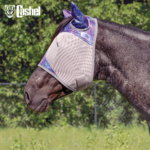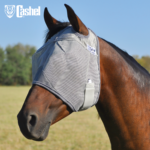The Problem:
Three weeks ago, I purchased a 5-year-old gelding through an auction. He is very frightened and spooky at any odd noise or object and shows signs of being barn sour. I haven’t taken him more than 200 yards from the barn because he gets very agitated. He once started to rear with someone in the saddle.
Yesterday, when the vet was checking his teeth, the vet discovered an old injury where the tongue appears to have been cut and healed. When we reached for his tongue on the side of the old injury, without warning the horse reared and went over backward. When we tried again, the horse tossed his head as if to warn us he would do it again.
Is this horse too unpredictable and dangerous to make a safe trail horse? Can this pattern of extreme fear ever be changed?
L.D., Niagara Falls, New York
The American Quarter Horse Journal has brought its readers the greatest events, introduced them to legendary horses and people, and provided tips on riding, training, racing, management and health.
The McCalls? answer:
The answer to this question centers around L.D.?s definition of the words ?unpredictable,? ?dangerous,? and ?safe.? Horses are big, powerful athletes that can react faster than humans. This makes them inherently more unsafe to be around than a goldfish.
Each and every one of us that works and lives with horses assumes a certain amount of risk of injury from our horse companions. Deciding which horse presents more of a danger than we are willing to assume is a very personal choice that everyone has to make for themselves.
We believe that unpredictable horses who flip over without warning present too great a risk to be called ?safe.? It is hard, however, to tell from the brief description in the question if this horse falls into that category. To assess the risk, more information is needed:
Exactly how did the horse rear? Did he rear up to escape from the man?s reach? Or did he go up in terror to escape the world?
Exactly what happened when the vet reached for the tongue that caused the horse to flip over? Was the horse forced to give his tongue? Or was it pried gently out of his mouth?
What is the length of time between stimulus (reaching for the tongue) and the response (flipping over)? Did he lift off the ground several times before flipping over? Or did he flip over in the blink of an eye?
The answers to these questions should help L.D. assess the relative risk of owning this horse.
Fortunately the second question ? ?Can this pattern of extreme fear ever be changed?? ? is easier to talk about. The answer for such horses is usually a qualified ?yes.? Through tender loving care and desensitization techniques, most horses will respond in a positive manner.
The reason for the ?qualified yes? is important to understand. A physical wound, like a cut tongue, leaves a scar that is nearly impossible to remove. Likewise, a horse that has undergone severe mental trauma will be mentally scarred. A similar situation may trigger a flashback, causing the horse to express its original escape behavior. This mental wound makes it difficult for the horse to ever completely trust a human again. Knowing this, it is equally as difficult for the rider to ever be completely confident in this horse.
The Journal brings readers the stories, articles, statistics and information they depend on for success in their horse business or hobby.
Time, patience and consistently demonstrating the correct response heals a lot of problems. But the ultimate answer to L.D.?s question centers around her needs and skills.
Our definition of a safe trail horse is one that can be trusted. A horse that the owner can ride without fear while enjoying the companionship of other horsemen. A horse that will, willingly and safely, carry his rider over all kinds of terrain so that the beauty of the outdoors can be experienced.
If L.D. bought this horse because she wanted a challenging training project, our advice would be to assess the risk and decide if you have the skills to fix him. If the horse was bought to be a trail horse, sell the horse and find one that won?t take lots of training before it is ready to ?try? and become a trail horse.






